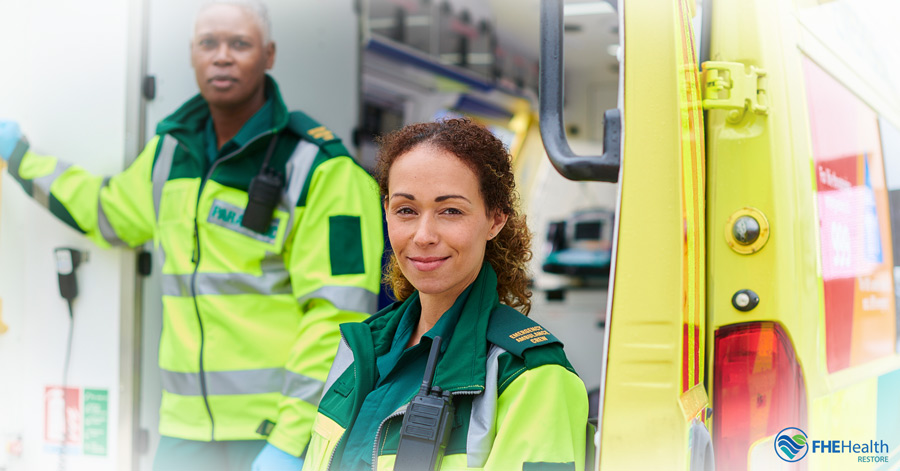
First responders are routinely exposed to traumatic events and high-stress situations that have a profoundly negative effect on their mental well-being as a whole. While employee mental health is crucial in any industry, it’s even more important for those who work tirelessly to protect and save others. Yet first responders show high rates of PTSD, anxiety and suicidal ideation, which is exacerbated by the stigma surrounding mental health issues that can cause first responders to fail to seek appropriate care.
A second problem exists in first responders’ mental health: the large gender gap. According to recent studies, women compose nearly half of the nation’s workforce but account for just 7.3% of firefighters, 13% of police officers and less than 35% of emergency medical personnel. Being such an underrepresented group means much of the care designed to support first responders is geared toward men, often leaving women with less support than their male peers.
What are the Key Differences in Male and Female First Responders’ Mental Health?
At first glance, it’s evident there are gender differences between men and women. Unfortunately, some studies have suggested that these physical differences can lead to gender bias, which may be intentional or unintentional. This bias can make the mental load heavier for female first responders since many believe they have something to prove by working in a male-dominated field.
But gender differences go deeper than physical characteristics or inherent biases. Women cope with stress and trauma differently, which becomes apparent when you look at the most common mental health challenges facing each gender. For example, men are more likely to battle substance use disorders and antisocial behaviors when faced with mental challenges. However, women are significantly more likely to experience depression and anxiety.
Since men display different behaviors and mental health challenges when faced with trauma and coping, it makes sense that women would feel unsupported in a primarily male field. Most of the resources available for supporting first responders’ mental health are based on the needs of men, but women have a different set of mental health needs due to physiological and biological differences.
Are There Obstacles to Supporting Female First Responder Mental Health?
First responders have always been predominately male, but more and more women are joining the ranks of police officers, firefighters and EMTs. Operating as a minority automatically places female first responders in a precarious position. However, they face additional obstacles as well.
For starters, the impact of first responder work on the female population has received little attention and hasn’t been well studied. This means it’s hard to determine their mental and physical health needs accurately. Without knowing a person’s true needs, any supportive efforts are moot at best. More research needs to be done on the mental health needs of the ever-growing female first responder population.
Working in a male-dominated field has its unique challenges. Women are often not taken seriously and suffer additional hardships caused by sex-based stereotypes, expectations and roles. These stereotypes are thought to increase the rates of burnout and coping in female first responders.
What are the Ways to Support the Needs of Employee Mental Health Regardless of Gender?
First responders need to feel their best, regardless of gender, since they’re responsible for the lives of others every time they punch in for work. Supporting mental health in the workplace is up to the employer. Ways first responder employers can support the mental health of their teams, regardless of gender, include:
- Ensuring senior leaders support improving mental health in the workplace
- Creating a supportive, understanding environment for all first responders
- Adopting a management system for mental health challenges faced by first responders
- Ensuring all adopted strategies work broadly for both male and female first responders
- Implementing campaigns and policies that advocate destigmatizing mental health problems
- Educating first responders and their families on mental health issues
- Establishing a network of trusted mental health providers that first responders can be referred to
- Establishing peer support programs
- Learning to recognize the signs and symptoms of mental health challenges
General ways employees’ mental health can be supported include:
- Understanding how mental health impacts employees
- Making mental health training mandatory for all management
- Including mental health coverage as part of the employer’s health care plan
- Building flexibility into employees’ schedules as much as possible
- Offering yoga, meditation rooms or mindfulness training in the workplace
- Encouraging employees to use their vacation time
How Do We Break Down Barriers in Gender Disparity for First Responders?
While supporting the needs of both genders is crucial, steps must be taken to break down barriers in gender disparity among first responders and mental health issues. To do this, more research needs to be done on how the high stress and traumatic events regularly experienced by police officers, firefighters and EMTs affect women. Only when extensive research has been completed can employers provide appropriate resources for their female staff.
Policies need to be created to support women as first responders. More robust policies must also exist to discourage the gender bias females face in this male-dominated field.






